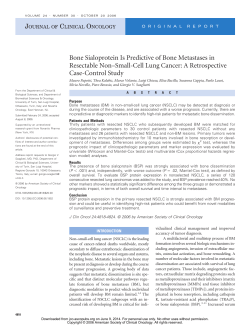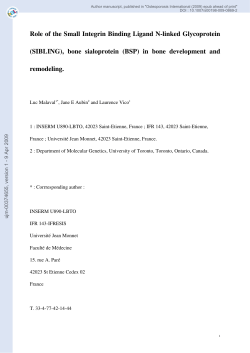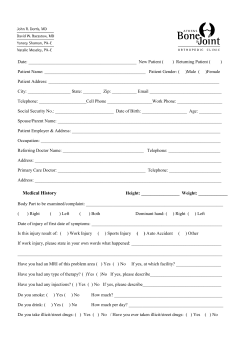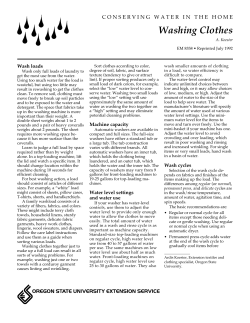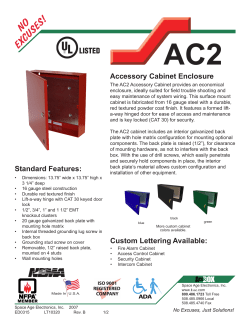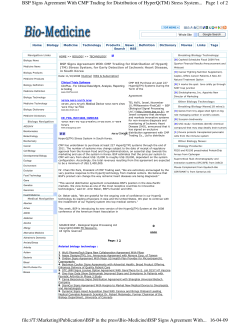
Document 5698
Li StarFish S.r.l. Via Cavour, 35 - 20063 Cernusco S/N (MI), Italy Tel. +39-02-92150794 - Fax. +39-02-92157285 info@listarfish.it -www.listarfish.it Manual Bone Sialoprotein (BSP) ELISA Kit For the in vitro determination of underglycosylated bone sialoprotein in serum For research use only Valid from 07.01.2009 + 8 °C IMM-K 4222 + 2 °C 96 8 Arbeitsanleitung/Manual Bone Sialoprotein ELISA 1. INTENDED USE The described Assay is intended for the quantitative determination of underglycosylated Bone Sialoprotein in serum. It is for research use only. 2. INTRODUCTION Bone Sialoprotein is a phosphorylated glycoprotein that comprises 12% of the total noncollagenous proteins in bone and is thought to be involved in bone mineralization and remodelling. The polypeptide chain of BSP has a molecular weight of 35 kDa. Native BSP has an apparent molecular weight of 70-80 kDa due to complex posttranslational modifications involving glycosylation. BSP is synthesized mainly by skeletal-associated cell types, including fibroblasts, hypertrophic chondrocytes, osteoblasts, osteocytes, osteoclasts, as well as trophoblasts. BSP is overexpressed and underglycosylated in human primary breast and prostate cancers that metastasize to the bone, whereby BSP expression correlates with the development of microcalcifications. Underglycosylated BSP is also expressed by other tumours, such as lung cancer, thyroid cancer, multiple myeloma and neuroblastoma, that predominantly metastasise to bones. 3. PRINCIPLE OF THE TEST This sandwich ELISA is designed for the quantitative determination of underglycosylated Bone Sialoprotein in serum. The test principle is based on interaction of the antigen in the samples or standards and with the antibody coated on the wells of the microtiter plate. A peroxidase-conjugated secondary antibody is used for detection and quantification, and tetramethylbenzidine (TMB) as a peroxidase substrate. The enzymatic reaction is terminated by an acidic stop solution. A dose response curve of absorbance unit (optical density, OD at 450 nm) vs. concentration is generated using the values obtained from the standards. Bone Sialoprotein present in the samples is determined directly from this curve. 9 Arbeitsanleitung/Manual Bone Sialoprotein ELISA 4. MATERIAL SUPPLIED Cat. No Label Kit Components Quantity K 4222MTP MTP Microtiter plate, precoated 12 x 8 wells K 4222WP WASHBUF ELISA wash concentrate, 10 x 100 ml K 4222PV SAMPLEBUF Sample dilution buffer 15 ml K 4222K CONJ Conjugate (Mouse-anti-BSP, Peroxidaselabeled) 200 µl K 4222ST STD Standards 2 x 6 vials K 4222KO CTRL Control, lyophilized 2 x 1 vial K 4222TMB SUB TMB substrate (Tetramethylbenzidine), ready to use 15 ml K 4222AC STOP ELISA stop solution, ready to use 15 ml 5. MATERIAL REQUIRED BUT NOT SUPPLIED • • • • • • • • Bidistilled water (aqua bidest.) Precision pipettors calibrated and tips to deliver 5-1000 µl Foil to cover the microtiter plate Horizontal microtiter plate shaker A multi-channel dispenser or repeating dispenser Centrifuge capable of 3000 x g Vortex-Mixer Standard laboratory glass or plastic vials, cups, etc. • Microtiter plate reader at 450 or 405 nm (reference wave length 620 or 690 nm) 10 Arbeitsanleitung/Manual Bone Sialoprotein ELISA 6. PREPARATION AND STORAGE OF REAGENTS • Reagents with a volume less than 100 µl should be centrifuged before use to avoid loss of volume. • The WASHBUF (wash buffer concentrate) should be diluted with aqua bidest. 1:10 before use (100 ml WASHBUF + 900 ml aqua bidest.), mix well. Crystals could occur due to high salt concentration in the stock solutions. The crystals must be redissolved at 37°C in a water bath before dilution of the buffer solutions. The WASHBUF is stable at 2-8°C until the expiry date stated on the label. Diluted buffer solution can be stored in a closed flask at 2-8°C for one month. • The lyophilized STD (standards) and CTRL (control) are stable at 2-8°C until the expiry date stated on the label. The STD (standards) and CTRL (control) must be reconstituted with 600 µl aqua bidest. Allow the vial content to dissolve for 10 minutes at room temperature and mix thoroughly by gentle inversion to insure complete reconstitution. Reconstituted standards and controls can be stored at -20°C for three weeks. • The CONJ (conjugate) must be diluted 1: 100 in wash buffer. 7. PRECAUTIONS • Human materials used in kit components were tested and found to be negative for HIV, Hepatitis B and Hepatitis C. However, for safety reasons, all kit components should be treated as potentially infectious. • Kit reagents contain sodium azide or thimerosal as bactericides. Sodium azide and thimerosal are toxic. Substrates for the enzymatic color reactions are toxic and carcinogenic. Avoid contact with skin or mucous membranes. • Stop solution is composed of sulphuric acid, which is a strong acid. Even diluted, it still must be handled with care. It can cause acid burns and should be handled with gloves, eye protection and appropriate protective clothing. Any spills should be wiped out immediately with copious quantities of water. • Reagents should not be used beyond the expiration date shown on the kit label. 11 Arbeitsanleitung/Manual Bone Sialoprotein ELISA 8. SPECIMEN COLLECTION AND PREPARATION Serum Serum samples should be diluted 1:10 with SAMPLEBUF (sample dilution buffer) before use (e.g. 30 µl sample + 270 µl SAMPLEBUF). Store samples at -20 °C until use. 9. ASSAY PROCEDURE Procedural notes • Do not interchange different lot numbers of any kit component within the same assay. • Substrate solution should remain colourless until use. • To ensure accurate results, proper adhesion of plate sealers during incubation steps is necessary. • Avoid foaming when mixing reagents. • The assay should always be performed according the enclosed manual. 12 Arbeitsanleitung/Manual Bone Sialoprotein ELISA Test procedure Wash the PLATE (precoated microtiter plate) 5 x with 250 µl of diluted wash buffer before use. After the final washing step, empty all liquid from the wells and firmly tap the plate upside down on adsorbent paper to remove any remaining wash buffer. Run all standards and samples in duplicate. 1. Add 100 µl of STD (standards), CTRL (control) or samples into each well in duplicate 2. Incubate for 3 hours at room temperature shaking on a horizontal mixer 3. Aspirate and wash the wells 5 x with 250 µl of diluted wash buffer. After the final washing step, empty all liquid from the wells and firmly tap the plate upside down on adsorbent paper to remove any remaining wash buffer 4. Add 100 µl of CONJ (conjugate) into each well 5. Incubate for 1 hour at room temperature shaking on a horizontal mixer 6. Aspirate and wash the wells 5 x with 250 µl of diluted wash buffer. After the final washing step, empty all liquid from the wells and firmly tap the plate upside down on adsorbent paper to remove any remaining wash buffer 7. Add 100 µl of SUB (substrate solution) 8. Incubate for 5-15 minutes at room temperature in the dark 9. Add 50 µl of STOP (stop solution) 10. Determine absorption immediately with an ELISA reader at 450 nm against 620 nm (or 690 nm) as a reference. If no reference wavelength is available, read only at 450 nm. If the extinction of the highest standard exceeds the range of the photometer, absorption must be measured immediately at 405 nm against 620 nm as a reference 13 Arbeitsanleitung/Manual Bone Sialoprotein ELISA 10. RESULTS We recommend the use of the "4-Parameter-algorithm" for test evaluation. Alternatively, point-to-point-calculation or spline-function can be used. The plausibility of the pairs of values should be examined before the automatic evaluation of the results. If this option is not available with the used program, a control of the paired values should be done manually. 14. GENERAL NOTES ON THE TEST AND TEST PROCEDURE • All reagents in the kit package are for research use only. • Guidelines for medical laboratories should be observed. • Incubation time, incubation temperature and pipetting volumes of the components are defined by the producer. Any variation of the test procedure, which is not coordinated with the producer, may influence the results of the test. Immundiagnostik AG can therefore not be held responsible for any damage resulting from wrong use. • Warranty claims and complaints in respect of deficiencies must be logged within 14 days after receipt of the product. The product shall be send to Immundiagnostik AG along with a written complaint. 1/7/2009 14112003_Bone Sialoprotein .doc 14
© Copyright 2025




